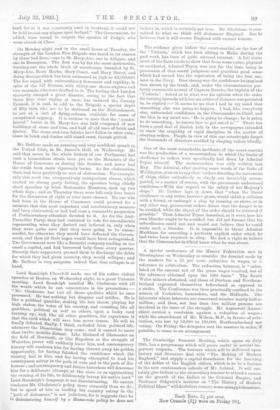One of the most remarkable incidents of the court-martial was
the production of a memorandum in which the limits of obedience to orders were specifically laid down by Admiral Tryon himself. The memorandum was only written last May. The Admiral, after quoting some words of the Duke of Wellington, goes on to say that "orders directing the movement of ships, either collectively or singly, are invariably accom- panied, as a matter of course, with the paramount understood. condition,—With due regard to the safety of her Majesty's ships." He further lays it down that "when the literal obedience to any order, however given, would entail a collision with a friend, or endanger a ship by running on shore, or in any other way, paramount orders direct that the danger is to be avoided, while the object of the order should be attained if possible." Thus Admiral Tryon described, as it were, how his own blunder ought to be avoided, but did not foresee that his subordinates could not and would not believe that he could make such a blunder. It is impossible to blame Admiral Markham for executing a perfectly explicit order which he had twice been required to obey. He had a right to believe that the Commander-in-Chief knew what he was .about.


































 Previous page
Previous page